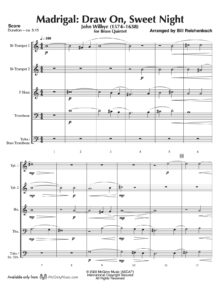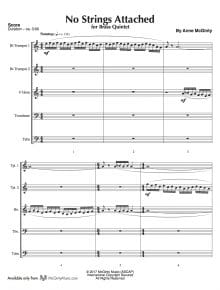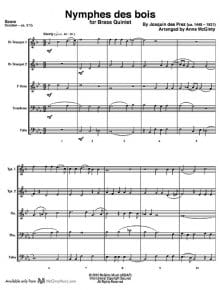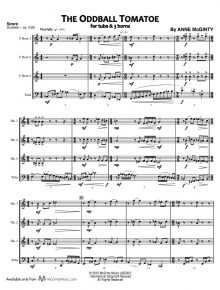Search Music
Music Categories
PDF Download Only
Purchase. Print. Play.
-
Madrigal: Draw On, Sweet Night – Brass Quintet
John Wilbye (1574 – 1638) was an English composer, one of the finest madrigalists of his time. Madrigal: Draw On, Sweet Night, written over 400 years ago, is his most well known and greatest work. There is a complex array of harmonic shifts, with constant changes between minor and major. It is delicate, yet powerful, and will work well in any church setting or recital. There is an artistic unity to his writing that every audience should appreciate.
Composer: Bill Reichenbach
Instrumentation: 2 Bb Trumpets, F Horn, Trombone, Bass Trombone/Tuba
Duration/# of Pages: ca. 2:00 or 5:15 / 21 pages, 8.5″ x 11″
Key: N/A -
No Strings Attached – Brass Quintet
It is so easy to add special conditions, restrictions and expectations to almost anything — even music. Using this as extramusical inspiration, No Strings Attached first attaches each of the strings, followed by a spirited and rhythmic romp interspersed with unifying chorales. At the end, each of the strings are released, one by one.
Music is one of the most valuable things we can share without asking for or expecting anything in return.
Composer: Anne McGinty
Instrumentation: 2 Bb Trumpets, F Horn, Trombone & Tuba
Duration/# of Pages: ca. 3:00 / 21 pages, 8.5″ x 11″
Key: N/A -
Nymphes des Bois (Josquin) – Brass Quintet
Nymphes des bois, also known as La Déploration de Johannes Ockeghem, is a lament by Josquin des Prez (ca. 1445 – 1521) on the death of his predecessor, Ockeghem. Josquin was one of the most influential Renaissance composers and was considered a great master of his time.
The music is based on a poem (elegy) by Jean Molinet, a French poet and composer. The descending thirds in the chorus represent the names of the composers of that time: Josquin, Pierson, Brumel and Compére.
The lyrics to the chorus are:
Put on the clothes of mourning.
Josquin, Pierson, Brumel, Compére.
And weep great tears from your eyes,
For you have lost your good father.
May they rest in peace.
AmenExcerpt graciously provided by the Tower Brass Quintet.
Composer: Anne McGinty
Instrumentation: 2 Trumpets, Horn, Trombone & Tuba
Duration/# of Pages: ca. 3:15 / 10 pages, 8.5″ x 11″
Key: N/A -
Oddball Tomatoe, The
The Oddball Tomatoe (sic) is based on a short story (with illustrations) written by a friend of the composer's when he was in the 6th grade, titled “The Tomatoe That Chomped Up New York City”. The story is about a hungry little tomato that chomp-chomp-chomps everything from the carrots in the garden to the barn, the house and more before acquiring a taste for metal, which made him a metal tomato. The first sentence was the inspiration for this piece: “Once there was a little oddball tomatoe.”
He ate cars, a water tower, the city hall and the Empire State Building and became a danger to every city. While walking to California he snatched a plane out of the air and chomped it. The army aimed bombs at him, to no avail. In Los Angeles it started chomping on the power lines as it thought they were spaghetti. Alas, he got shocked to death and fell in the ocean, never to be seen again.
Only the tuba could possibly become the metal tomato and get that big and calamitous, with lots of chomping grace notes along the way. Only three horns could depict little carrots, large buildings, bombs, New York City, power lines and more.
The story made the composer smile, and the piece is basically program music that attempts to musically depict this extra-musical story. The story, however, is not essential to the performance of this piece.
Composer: Anne McGinty
Instrumentation: Tuba & 3 Horns
Duration/# of Pages: ca. 4:20 / 22 pages, 8.5″ x 11″
Key: N/A




